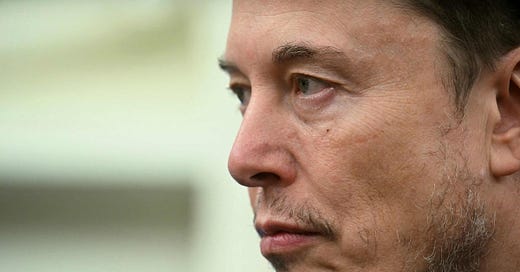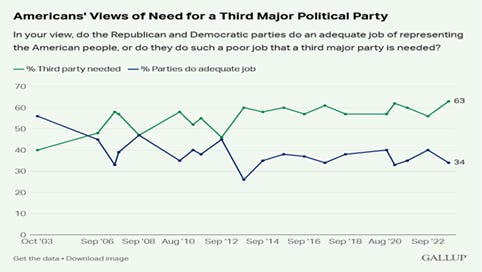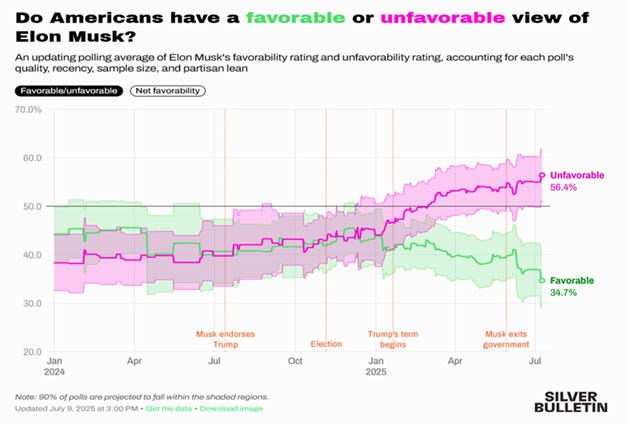Republican and Democratic Party leaders are probably not fretting over the formation of billionaire Elon Musk’s “American Party” following passage of Donald Trump’s sprawling “Big, Beautiful Bill.” Musk’s main target is the projected $3 trillion or more that bill adds to the national deficit.
Most believe the business magnate’s effort will likely implode on the “launchpad” as did Musk’s recent Space X rocket. He does have a plan to sway Congress by targeting a few seats in 2026, but forming a third party is not the route. His sole weapon is money, but dollars alone do not buy political happiness. And whatever voter base he had initially has dwindled, particularly after his fallout with Trump and the potential negative impact of his DOGE actions on safety net programs, other popular programs, and the economy.
Musk was heralded for investing almost $300 million in Trump’s campaign, helping to put Trump over the finish line and into the White House. But as documented here, his “stock” has fallen dramatically since his now ongoing confrontation with Trump and his “chain saw” slashing of vital social programs. And launching a third party is different than supporting an established candidate of an established party.
Our objective here to explore third party mythology, the roots of its failures, and why Musk’s third party strategy is not the route to achieve his objectives.
Third Party Mythology
Yes, many have believed for some time that the landscape is ripe for a third party movement. Poll after poll over the years have found Americans deeply frustrated with the two political parties that dominate American politics. Recent polling again finds much of the public has grim views of both parties, particularly among many Democrats who have lost faith in a seemingly message-less and leaderless party unable to combat Trump.
Musk’s initiative is no different. As a political newbie, Musk’s effort was fueled by a survey released last week of 1,000 registered voters conducted by Republican-leaning Quantus Insights finding that 40 percent would consider backing the Tesla and SpaceX CEO’s party over traditional GOP or Democratic candidates.
In reality few third parties in recent history have smashed the long-standing curse that has befallen those efforts – regardless of where they start out. Some have been impactful in forcing the two major parties to reinvent themselves over and over. A few others have been “spoilers,” draining deciding votes from a frontrunner.
Some still dream that a third party can succeed in breaking the two-party deadlock. See Robert F. Kennedy Jr. in 2024 for an example of how the myth drives the belief. As will be explored, where third-party efforts start is not where they finish. Their support dwindles as elections approach for reasons that will be explained.
Third-party success has been rare, particularly in down-ballot races. CNN finds that only 24 of all winners out of over 13,000 races since 1970 were independents/third party or write-ins. And Musk’s cash alone may not increase the odds.
Musk’s Longshot Alternative Strategy
What seems like the usual political folly does have an underlying strategy. Musk, being foreign born, is not even eligible to run for the oval office. Instead, the world’s richest man plans to put his fortune behind an “extremely concentrated force at a precise location on the battlefield” – a few contested House and Senate seats to create a legislative faction that exerts control over both bodies by preventing anything from passing without their crucial votes.
Musk vowed after passage of Trump’s “Beautiful Bill” that Republicans who supported Trump’s mega bill “will lose their primary next year if it is the last thing I do on this Earth.” But will those Musk candidates challenge Republicans under the banner of his “American Party, or as in primaries as Republicans?
The argument here is that forming a third party is not the route to achieve his objectives. The “American Party” will no doubt suffer the disappointing fate of almost all third parties.
Musk’s Liabilities: A Primer on How Not to Succeed
Whatever their impact, history finds that third parties are formed by those leaders who already have a mass following or have championed a platform that fueled their rise. None of these conditions apply to Elon Musk. Let’s outline Musk’s liabilities as a party founder.
#1. Does Musk Have a Base? No
A third party requires a base. Following Musk’s feud with Trump, we are left asking, “Who are Musk’s supporters?” CNN’s Harry Enten estimates that Musk’s current potential base is a meager 4 percent. By Enten’s calculation, that’s the number of people who view Musk favorably and view the GOP unfavorably. Enten argues that even most of those who like Musk also already have a party, Trump’s GOP. These voters are unlikely to switch allegiance to Musk. And Musk’s standing among the electorate as a whole has sunk into deep negative territory. Nate Silver finds that only 36.7 percent of Americans have a favorable view of Musk while 55.0 percent view him unfavorably. That’s a net favorability rating of -18.4 – even lower than Donald Trump’s net -6.4.
#2. Musk’s Main Issue Is Not Voters’ Main Issue
What mainly fueled Musk to push for a third party movement was the sprawling Big, Beautiful Bill’s projected $3 trillion impact on the U.S. debt and deficit. The bill’s major priority was tax cuts, mainly for the wealthy, and finding ways to pay for those cuts through growing deficits. He slammed Trump’s mega bill, arguing it will “cause immense strategic harm” to America on account of the trillions of dollars the bill is projected to add to the debt of the nation.
“Our country needs an alternative to the Democrat-Republican uniparty so that the people actually have a VOICE,” he wrote on X, his social media platform.
Musk does correctly read the electorate’s overall opposition to Trump’s bill, but he misreads the reasons for their ire. Much polling finds large majorities do oppose the bill. A mid-June Fox News poll of registered voters found only 38% support with 59% opposed.
But the bill’s major opposition stems from cutbacks in safety net spending, not the increased government deficit that triggered Musk’s actions. In that Fox News poll voters said that the bill would hurt their families more (49%) than help them (23%). Less than half (49%) of Republicans say the bill would help.
#3. Fear of Money in Politics
Musk’s political leverage is based on the seemingly endless dollars he can use to influence politicians. But Americans have long feared that money and special interests have too much influence. Musk’s initial foray into funding a down-ballot race, a $22 million injection into Michigan’s Republican Supreme Court candidate Brad Schimmel, backfired. It ended not just in a Democratic landslide, but in Musk himself coming under attack. In fact, Democrats framed the race as a referendum on Musk as they delivered Schimmel a crushing defeat. Democrats branded Musk as an unelected, oligarchic boogeyman with unchecked power.
Pew polling finds that large shares of Americans say major donors, lobbyists and special interests have too much influence: 72 percent say there should be limits on spending by individuals and organizations, while just 11 percent say they should be able to spend as much as they want.
This fear of money’s influence was compounded after the Citizens United decision gave rise to Super PACs, which can raise and spend unlimited money from wealthy donors and special interests, and increased the influence of dark money.
#4. Voters Have Little Understanding of the Bill He’s Targeting
Pivoting his efforts on the Big, Beautiful Bill encounters another stumbling block. Most people have little understanding of the bill’s provisions. An early June Washington Post/Ipsos poll, only 34% of respondents said they had heard a great deal or a good amount about the just-passed House version of the bill. In a Morning Consult poll released on July 1, as the Senate prepared for a vote, only 38% said that they had seen, heard, or read a lot about the bill.
Some have questioned the extent to which House and Senate members even understand what’s in this bill that Trump muscled through. Some House Republicans publicly admitted that they didn’t read the bill and wouldn’t have voted for it if they had understood its contents, as the New York Times reports:
“Last week, Representative Mike Flood of Nebraska admitted during a town hall meeting in his district that he did not know that the bill would limit judges’ power to hold people in contempt for violating court orders. He would not have voted for the measure, he said, if he had realized. “
#5. Musk’s Chainsaw DOGE Cuts Alarmed Many Voters
Musk’s “chain saw approach” to slashing or wiping away vital programs in health care, medical research, and veterans’ services, among other departments cratered his standing. Musk and his DOGE herd were always in the polling dumpster among Democrats. When “war” broke out between Musk and Trump, many MAGAs turned against Musk as well.
#6. Third Party Candidate Support Erodes as Election Nears
In multiple elections, including the 1980, 1992, and 2016 presidential races, third-party candidates in Pew Research analysis hit early polling numbers that were much higher than their ultimate much lower vote share. For instance, in polls conducted in May and June 1980, between 21% and 24% of registered voters said they would like to see independent candidate John Anderson, a veteran Republican congressperson from Illinois, win when he ran for president against Republican Ronald Reagan and Democratic incumbent Jimmy Carter. Anderson went on to earn just 7% of the popular vote.
The same fade pattern held for Ross Perot. Perot was regularly receiving support from 20% or more of registered voters in polls. By May 1992 about a third of registered voters (33 percent) were telling pollsters they’d vote for or were leaning toward Perot. In a few surveys, he led both Bush and Clinton. Amid sharpening attacks from Republicans and Democrats, though, Perot’s numbers began falling. In mid-July, when his support was below 20% in most polls and falling, Perot quit the race.
Why does support fade for third party candidates. A major reason is deep unhappiness with the major party candidates in polling that later resolves itself. Joe Lenski of Edison Research summed it up:
“Saying you’ll vote for a longshot candidate weeks or months before Election Day is much different than holding a ballot and voting for a candidate you know can’t win.”
#7. Challenge of Just Getting on the Ballot
Mr. Musk, don’t forget a further obstacle. For third-party candidates, getting on state ballots is challenging and expensive. The two major parties control the statehouses nationwide and local election offices and enjoy automatic access to the ballot. JFK Jr. got kicked off the ballot in New York State in 2024 after a legal challenge. Besides the cost of gathering hundreds of thousands of signatures, third party candidates face expensive legal challenges that are often forbidding.
Concluding Advice to Elon Musk
Instead of wasting resources on a venture doomed by political realities, Elon Musk should pursue a strategy that actually works in American politics: identifying vulnerable Republican incumbents who voted for what Musk considers “fiscal irresponsibility” and quietly funding Republican primary challengers committed to Musk’s agenda. Forget mounting “American Party” candidates in the general election. And he needs to keep a low profile and avoid making the primary a referendum on Musk – as happened in Michigan
###







Maybe it's only comparing apples and oranges, but Michael Bloomberg reportedly spent nearly $1 billion on a 100-day presidential run in 2020. What did that get him? I'm guessing that Elon can sway some people, but how many is the big question. Perhaps following Mark's concluding advice to Elon Musk will be his best course of action. Excellent analysis by Mark Schulman as always! Thanks...............
Musk's money did make a tragic difference in 2024. Maybe it can work both ways. If Musk can draw away some votes to swing the vote balance in Congress, I'm all in. Sometimes it happens. I need to be optimistic about the possibility. We'll go from there.